Africa’s e-commerce sector is booming, driven by mobile phones, which account for 75% of online traffic in the region. With over 500 million e-commerce users expected by 2025, startups are leveraging mobile-first strategies to overcome challenges like high data costs and limited banking access. Here’s a quick look at seven leading mobile-first e-commerce startups reshaping the landscape:
- Jumia: Operates in 11 countries, partners with MTN for zero-rated data, and simplifies payments with Mobile Money.
- Konga: Focuses on Nigeria with KongaPay for secure payments and strong last-mile logistics.
- Takealot: South Africa’s leader, offering mobile-friendly shopping and same-day delivery.
- Sokowatch: A B2B platform connecting small retailers to suppliers with mobile apps and SMS ordering.
- Twiga Foods: Streamlines agricultural supply chains with offline functionality and mobile payments.
- MallforAfrica: Links African shoppers to global retailers with low-data modes and local-currency payments.
- Zando: Specializes in fashion and lifestyle in South Africa with social media integration and flexible logistics.
Quick Comparison
| Startup | Key Markets | Mobile Features | Payment Solutions | Strengths | Challenges |
|---|---|---|---|---|---|
| Jumia | 11 countries | Zero-rated data, low-data UI | JumiaPay, Mobile Money | Wide reach, strong logistics | High operational costs |
| Konga | Nigeria | Offline-ready app, omnichannel deals | KongaPay | Secure payments, local focus | Limited to Nigeria |
| Takealot | South Africa | Mobile-friendly checkout | Cash on delivery, cards | Same-day delivery, strong presence | No broader African reach |
| Sokowatch | East Africa | App + SMS ordering, same-day delivery | Credit for retailers | B2B focus, inventory tools | Narrow market focus |
| Twiga | Kenya | Offline mode, mobile ordering | Digital payments | Efficient supply chain | Regulatory challenges |
| MallforAfrica | Multiple markets | Low-data mode, offline browsing | Local payment gateways | Global retailer access | Currency fluctuation risks |
| Zando | South Africa | Social media integration, mobile app | Flexible options | Fashion focus, brand partnerships | Limited regional growth |
These startups are solving local challenges with mobile-first solutions, from secure payments to offline functionality, creating a thriving e-commerce ecosystem across Africa.
Inside Africa’s Amazon: Jumia
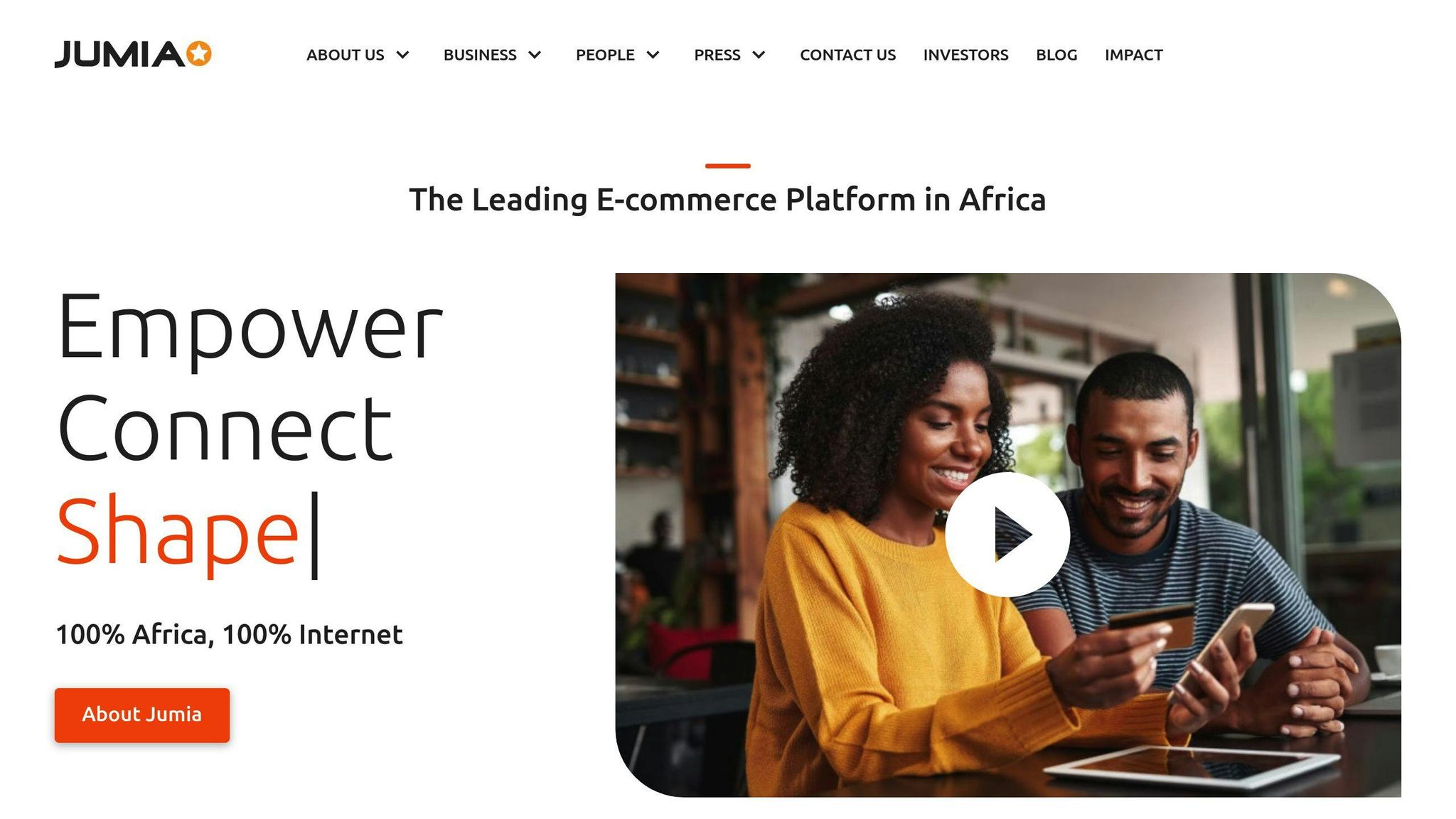
1. Jumia
Jumia is a major player in African e-commerce, standing out with its mobile-first strategy. Operating in 11 African countries, the platform draws over 70% of its traffic from mobile users, highlighting the success of its approach.
To tackle challenges like high data costs and limited banking access, Jumia partners with MTN. This collaboration includes zero-rated traffic and Mobile Money integration, simplifying transactions in key markets like Nigeria and Ivory Coast. These efforts make online shopping more accessible in areas where traditional banking is scarce.
Jumia’s logistics network ensures reliable delivery, even in remote regions. Its mobile-friendly design, optimized for low-data usage, allows users to shop easily, even with limited internet connectivity. This approach has significantly widened its reach.
"E-commerce in Africa requires a comprehensive mobile-first approach, and Jumia’s success demonstrates how strategic partnerships with mobile operators can drive market penetration." – Industry expert insight from Tech in Africa
The platform also leans into social commerce, seamlessly connecting buyers and sellers. Its marketplace hosts thousands of sellers and millions of consumers, creating a thriving mobile-driven shopping ecosystem.
Jumia’s strategies offer a blueprint for e-commerce success in Africa. By addressing local challenges like limited infrastructure and tailoring its approach to mobile usage, it has fueled significant growth. While Jumia sets the bar, other platforms like Konga are also stepping up to tackle Africa’s unique e-commerce landscape.
2. Konga
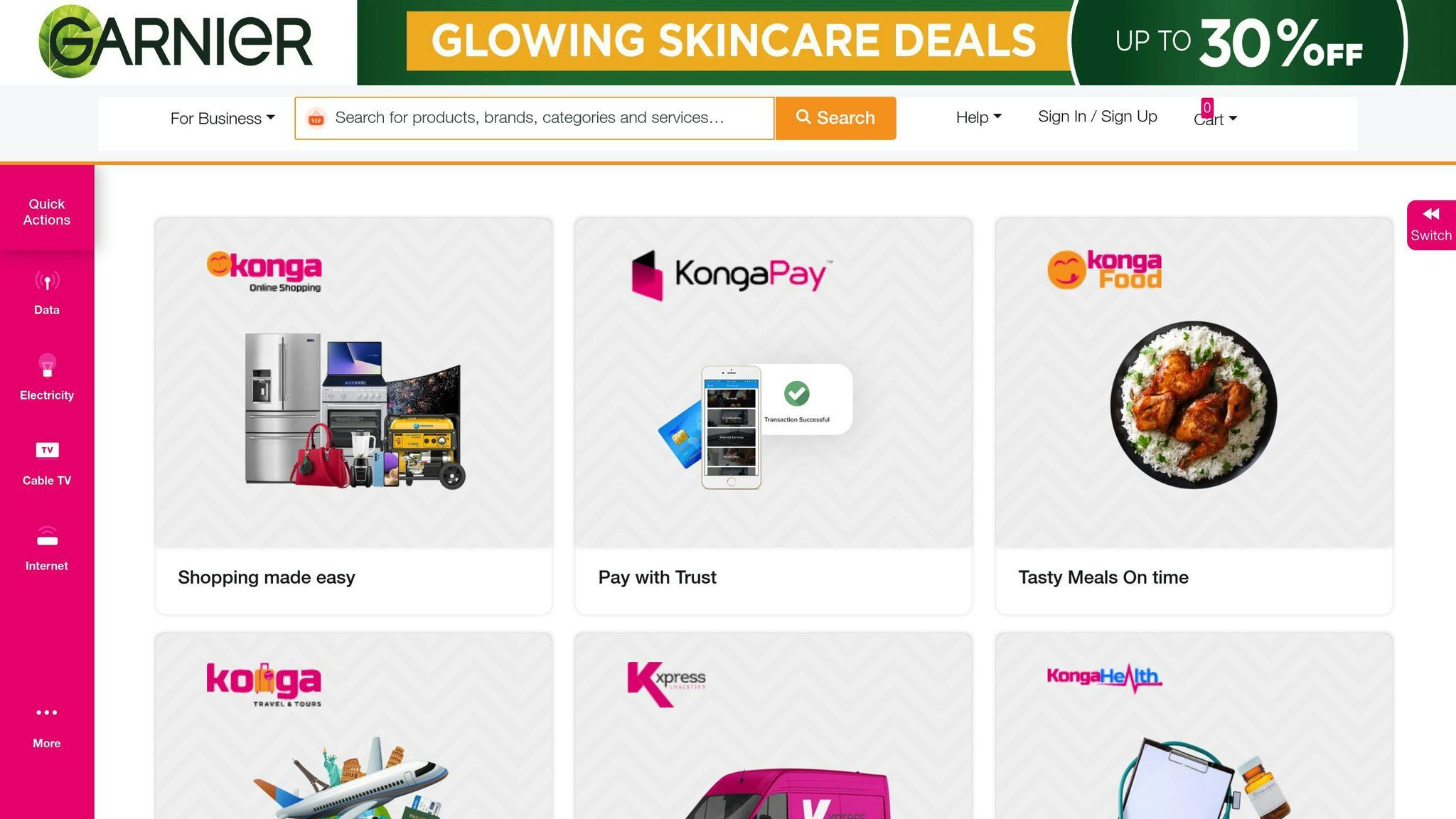
Konga has taken a different approach to mobile-first e-commerce by combining fintech solutions and a multi-channel strategy tailored specifically for Nigeria. After being acquired by the Zinox Group, the company experienced an impressive 800% growth.
A key part of Konga’s success is KongaPay, a secure payment platform approved in Nigeria. It simplifies transactions and helps bring financial services to underserved areas by removing the need for traditional banking. This blend of fintech and e-commerce has been highly effective in meeting local needs.
Konga has also made big strides in logistics, delivering 85% of orders to the last mile – a notable achievement given Africa’s logistical challenges. Its multi-channel strategy includes mobile-exclusive deals and promotions, offering discounts and smooth shopping experiences across devices.
Beyond e-commerce, KongaPay streamlines payments, while its logistics network ensures delivery even in hard-to-reach locations. By addressing infrastructure challenges and focusing on mobile-first solutions, Konga has built a scalable model for e-commerce growth in Africa.
Konga’s ability to integrate secure payments, reliable logistics, and targeted promotions highlights the success of its localized strategy. These efforts are making online shopping more accessible and convenient for Nigerian consumers.
3. Takealot
Takealot is a leading force in South Africa’s mobile-focused e-commerce space, handling more than 1 million orders every month. By prioritizing mobile-friendly shopping, the platform ensures fast, low-data browsing, making online shopping accessible for users across the country.
Its payment system supports a variety of methods, including mobile money and cash on delivery, offering flexibility that resonates with South African shoppers. This approach has paid off, with over 70% of sales now coming from mobile transactions.
"Takealot’s success can be attributed to its focus on providing a seamless customer experience, from browsing to delivery." – Kim Reid, CEO of Takealot
Takealot also stands out for its logistics. Using GPS tracking and a robust delivery network, the company offers same-day and next-day delivery options, raising the bar for e-commerce fulfillment in Africa. Reliable delivery has been a key factor in cementing its market leadership.
The platform actively engages customers through social media channels like Instagram and Facebook, running mobile-exclusive promotions and targeted campaigns to build loyalty. Its growth aligns with South Africa’s projected 17.4% e-commerce CAGR from 2020 to 2025.
Takealot’s approach highlights how South African e-commerce platforms are thriving in a mobile-first market. By combining mobile optimization, flexible payment options, and dependable delivery services, the company sets a strong example for others in the region.
4. Sokowatch
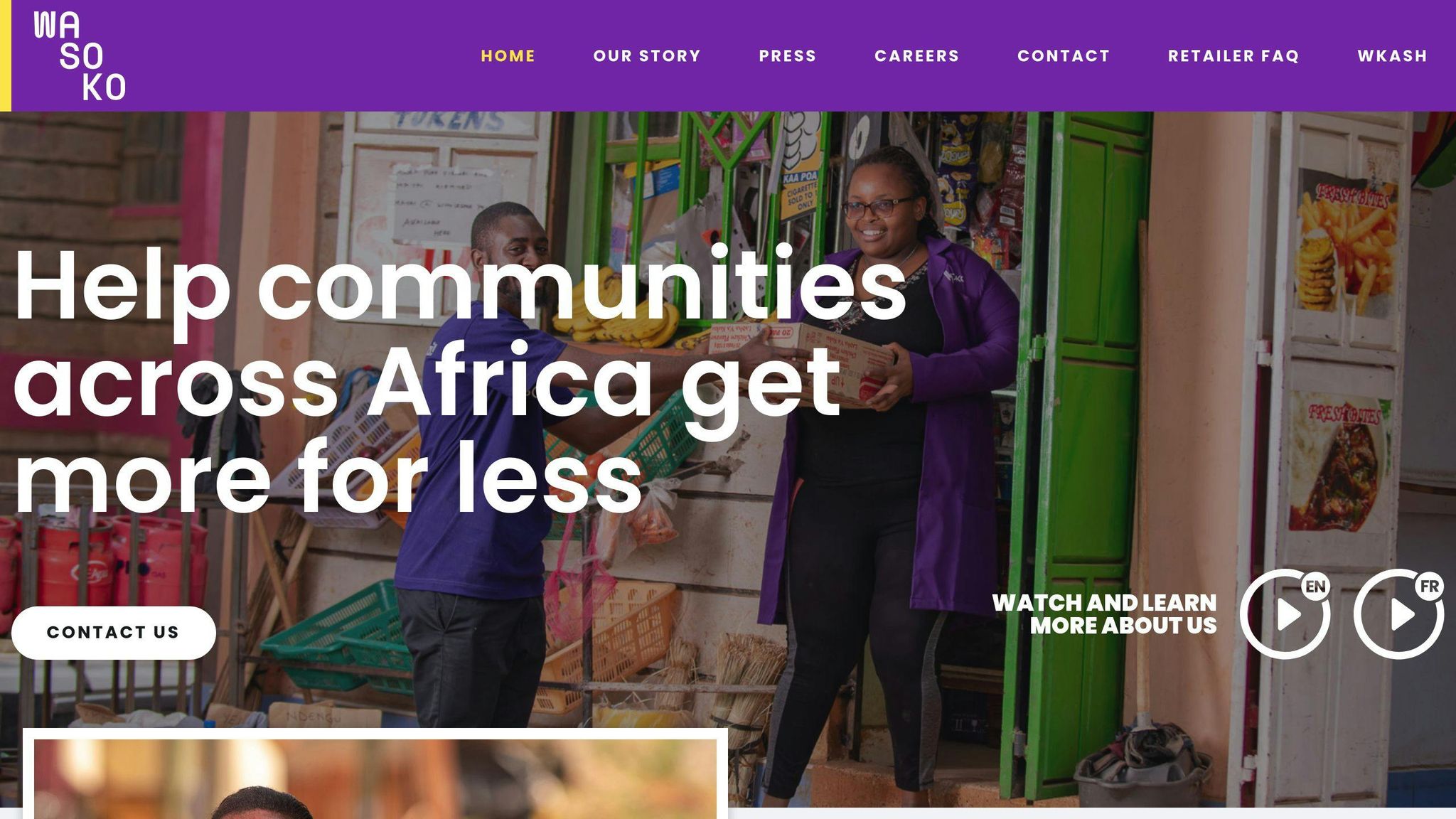
Sokowatch is transforming B2B e-commerce in East Africa with its mobile-first platform, designed to connect small retailers directly with suppliers. Unlike consumer-focused platforms like Jumia and Konga, Sokowatch zeroes in on the specific challenges faced by informal retailers.
Through its mobile app, Sokowatch enables retailers to manage inventory, place orders, and even access financial services. For those without smartphones, the platform offers SMS-based options, ensuring that even retailers with basic phones can participate. By leveraging mobile technology, Sokowatch also provides credit lines to underserved businesses, addressing a critical gap in financial access.
"We eliminate the middleman and make it quick and easy for merchants to order the stock they need and provide it at low prices. The goal is to make small stores more efficient and more sustainable." – Daniel Yu, CEO of Sokowatch
Sokowatch offers free same-day delivery through its warehouse network, cutting costs and saving time for retailers. After securing $14 million in Series A funding in 2020, the company expanded its operations to Tanzania, Rwanda, and Uganda.
What sets Sokowatch apart is its focus on accessibility. By optimizing for both smartphones and basic phones, the platform ensures usability for all types of retailers, even in areas with limited internet access.
| Feature | Benefit to Retailers |
|---|---|
| Mobile App + SMS Ordering | Easy access, regardless of device |
| Same-Day Delivery | Lower costs and faster restocking |
| Integrated Financial Services | Access to credit and digital payments |
| Low-Data Optimization | Works well in areas with poor connectivity |
Sokowatch’s mobile-first approach is paving the way for small businesses to thrive, providing a blueprint for other startups like Twiga Foods to tackle Africa’s e-commerce challenges.
sbb-itb-dd089af
5. Twiga Foods
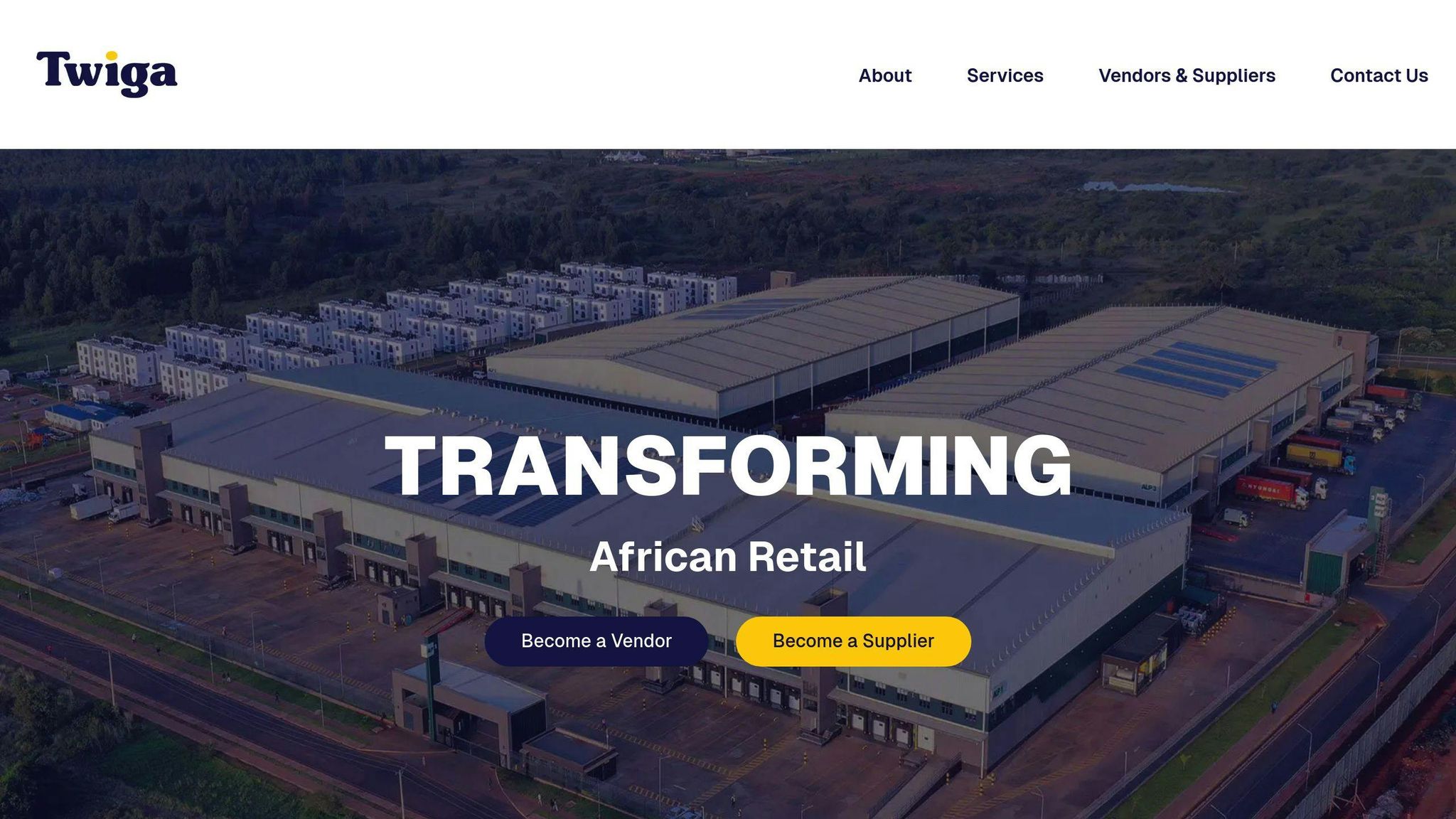
Twiga Foods, established in 2014, takes a different approach by focusing on the agricultural sector. Using a mobile-first platform, it connects farmers with retailers, streamlining agricultural supply chains across East Africa.
With its easy-to-use mobile app, Twiga Foods simplifies transactions between farmers and retailers while tackling major supply chain challenges. This approach has reshaped how agricultural products are delivered from farms to markets.
"We are using technology to build a more efficient and transparent supply chain that benefits both farmers and retailers." – Grant Brooke, Co-Founder of Twiga Foods
After securing major funding in 2019, Twiga Foods expanded its services to include:
| Feature | Benefit to Users |
|---|---|
| Offline Functionality | Provides access for rural farmers and retailers |
| Local Transport Partnerships | Reduces delivery costs with local collaborations |
| Financial Services Integration | Offers credit and mobile payment options for farmers |
| Mobile-Only Solutions | Tailors the platform to Africa’s mobile-first users |
One of the platform’s standout features is its offline functionality, ensuring that even rural users with limited connectivity can participate. This is especially important for retailers in remote areas where internet access can be unreliable.
Twiga Foods has also partnered with mobile operators to improve accessibility and usability. Beyond fresh produce, it now offers other essential goods, creating a broader B2B marketplace that meets a variety of retailer needs.
However, the company still faces challenges, such as navigating complex regulations across different African markets and maintaining technological investments. Despite these hurdles, Twiga Foods has become a key player in reshaping agricultural commerce with its mobile-first strategy.
6. MallforAfrica
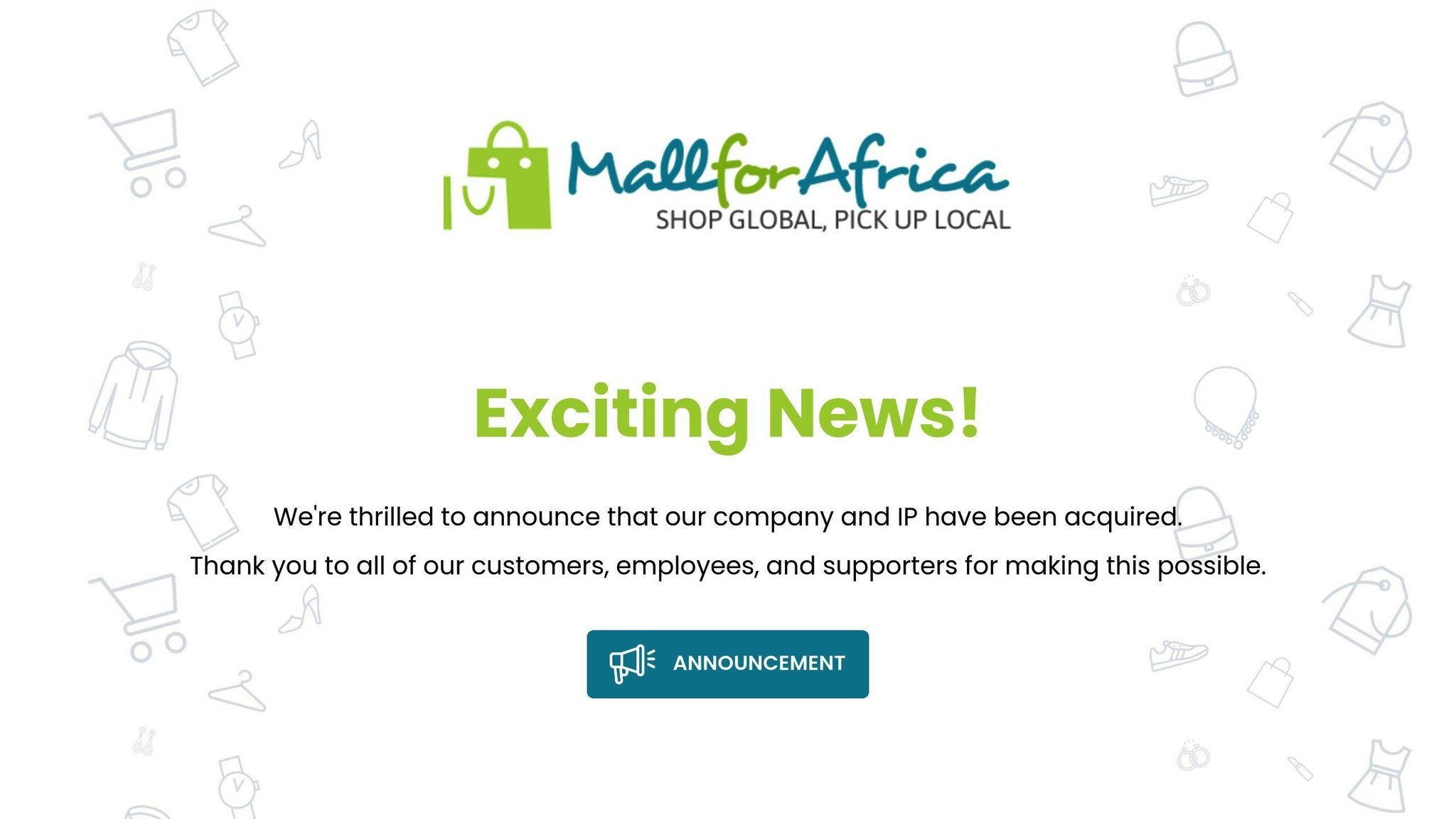
MallforAfrica connects African shoppers with international retailers through a mobile-focused platform designed specifically for local needs. Launched in 2011 by Chris and Tope Folayan, this platform opens up access to global products, meeting the growing demand for international shopping options in Africa.
The MallforAfrica app includes features designed for African users:
| Feature | Description | Benefit |
|---|---|---|
| Low-Data Mode | Optimized for limited bandwidth | Helps users save on data costs |
| Multi-Payment Integration | Accepts local payment methods | Ensures secure and convenient transactions |
| Offline Browsing | Access to product catalogs without an internet connection | Useful for areas with unstable connectivity |
| Smart Tracking System | Real-time tracking for orders | Improves delivery transparency |
With partnerships spanning over 200 global retailers like Amazon and eBay, MallforAfrica offers African consumers access to a vast range of international products. The platform ensures smooth delivery and secure local-currency payments by leveraging strategic collaborations and proprietary technology.
The app itself is user-friendly, featuring one-click checkout and push notifications to simplify the shopping experience for users of all technical skill levels. Recent enhancements include AI-driven delivery route optimization and digital wallet integration, making payments faster and more secure.
MallforAfrica also addresses specific local needs through:
- Digital wallet integration for safer transactions
- Community-based product recommendations
- AI-powered logistics for efficient delivery
While challenges remain, MallforAfrica continues to refine its technology and expand its reach across the continent. Its ability to connect local consumers with global markets showcases the potential of mobile-first platforms, setting a strong example for others like Zando to follow.
7. Zando

Launched in 2012, Zando has carved out a strong presence in South Africa’s e-commerce scene, specializing in fashion and lifestyle products. With a mobile-first platform, it has attracted over 2 million customers and partnered with more than 500 brands. Zando’s approach to payment systems, social media integration, and logistics has made it a standout player in the region’s digital growth.
The platform’s mobile-first approach focuses on three main areas:
| Focus Area | How It’s Applied | Result |
|---|---|---|
| Payment Options | Offers multiple payment methods, emphasizing mobile-friendly solutions | Boosts transaction success rates |
| Social Media Integration | Uses platforms for product discovery and engagement | Drives more interaction and product visibility |
| Logistics | Optimizes delivery using data and flexible pickup options | Enhances delivery speed and customer experience |
Zando’s mobile app is designed with users in mind, featuring tools like one-click purchasing and tailored product suggestions. During the pandemic, the platform experienced a surge in growth as online shopping gained traction in South Africa.
Its logistics system relies on mobile order data to manage stock levels and forecast demand. Additionally, Zando offers a customer-friendly 30-day return policy and uses data to tackle last-mile delivery challenges more effectively.
By focusing on mobile access, secure payment methods, and efficient logistics, Zando has created a model that resonates with African consumers. For other startups looking to tap into Africa’s growing mobile commerce market, Zando’s success offers practical lessons on meeting local needs.
The company’s strategy highlights the variety of methods African e-commerce businesses are using to thrive in a mobile-driven economy.
Comparison Table
Here’s a side-by-side look at how different startups in Africa are tackling e-commerce challenges and opportunities:
| Startup | Key Markets | Mobile-First Features | Payment Solutions | Strengths | Challenges |
|---|---|---|---|---|---|
| Jumia | 11 African countries | Zero-rated data via MTN partnership, Mobile UI | JumiaPay, Click-to-pay | Broad presence, Large selection | High operational costs in regions |
| Konga | Nigeria | Omnichannel approach, Offline-ready app | KongaPay, Flexible options | Strong logistics, Post-acquisition growth | Limited to Nigerian market |
| Sokowatch | East Africa | B2B platform, Mobile order tools | Integrated financial services | Extensive retailer network, Simplified inventory | Narrow B2B focus |
| Twiga Foods | Kenya | Mobile ordering system | Digital payments | Streamlined supply chain | Complex supply chain management |
| MallforAfrica | Multiple African markets | Cross-border shopping app | Secure payment gateway | Access to global retailers | Currency fluctuation risks |
| Zando | South Africa | Social media integration, One-click buying | Mobile payment options | Strong brand collaborations | Limited growth beyond South Africa |
| Takealot | South Africa | Mobile-friendly checkout | Secure payment system | Well-established market position | Lack of broader African expansion |
This table highlights how these startups are carving out their niches. Jumia stands out for its wide reach across 11 countries, while others, like Konga and Twiga Foods, focus on specific markets or supply chain efficiency. A common thread is the emphasis on mobile payment systems and features designed for low-connectivity environments – essential in a region where 75% of online traffic comes from mobile devices.
These companies show how mobile-first strategies are driving e-commerce growth, overcoming hurdles like connectivity issues and logistical challenges.
Conclusion
Africa’s mobile-first e-commerce market is experiencing rapid growth, fueled by startups addressing the continent’s specific needs and challenges through mobile technology. This approach has led to the creation of user-friendly solutions tailored to local conditions.
Mobile money transactions in Africa are expected to rise from $456 billion in 2020 to $540 billion by 2025, highlighting the pivotal role of mobile platforms in driving e-commerce adoption and improving financial access.
Startups like Jumia and Konga are leading the way with localized solutions. For instance, Jumia’s partnership with MTN for zero-rated data and KongaPay’s secure payment system tackle key issues such as accessibility and trust .
The sector’s future looks bright, with projections pointing to over half a billion e-commerce users and a 13.11% annual growth rate between 2023 and 2027. This expansion is being driven by urbanization, increased smartphone usage, and better internet connectivity across the region.
These examples underscore the importance of adapting global e-commerce strategies to Africa’s mobile-first landscape. The innovative approaches and local partnerships of these startups demonstrate how tailored solutions can thrive in challenging markets. Their journey offers insights for future entrepreneurs looking to navigate similar paths.
As these platforms continue to grow and refine their models, they are not only enabling commerce but also shaping the future of digital trade across Africa.
FAQs
Is ecommerce growing in Africa?
Yes, Africa’s e-commerce market is on the rise, with projections estimating it could reach $113 billion by 2029. This growth is fueled by increasing smartphone use, urbanization, and mobile partnerships across the region.
Some key developments shaping this market include:
- Mobile-first solutions designed for local needs
- Secure digital payment systems that build trust with consumers
- Offline functionality to ensure access in areas with limited connectivity
For example, Jumia’s collaboration with MTN to provide zero-rated data highlights how mobile-driven strategies can address connectivity challenges.
These advancements are turning Africa into a thriving hub for digital commerce. Startups across the continent are using mobile technology to tap into the growing demand, creating solutions that tackle local obstacles while expanding their reach.
Related Blog Posts
- E-commerce in Africa: 2025 Market Analysis and Trends
- 8 Solutions to Common African E-commerce Challenges
- How Mobile Social Platforms Drive African Startups
- 5 Mobile EdTech Startups Transforming Learning in Africa





